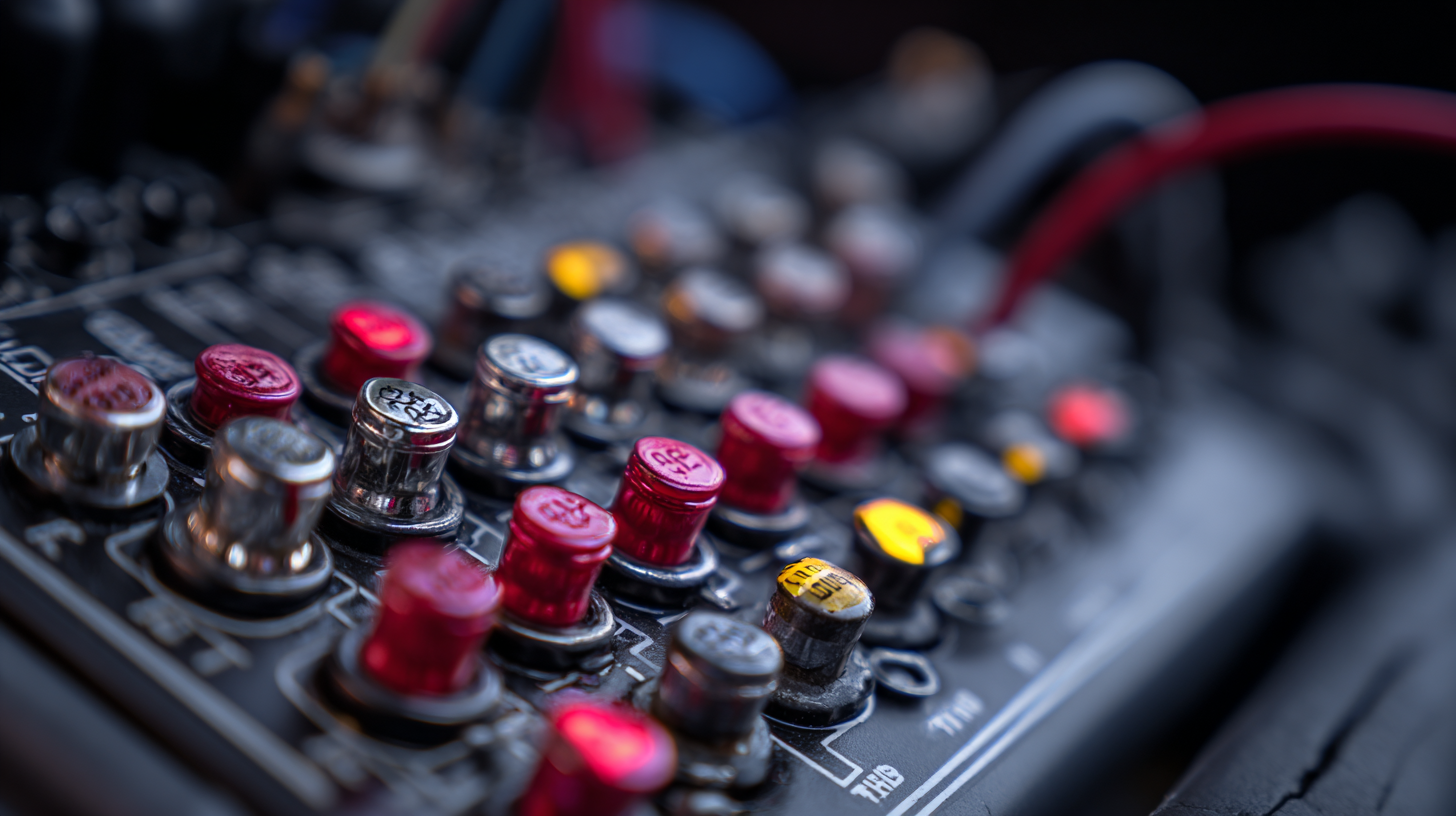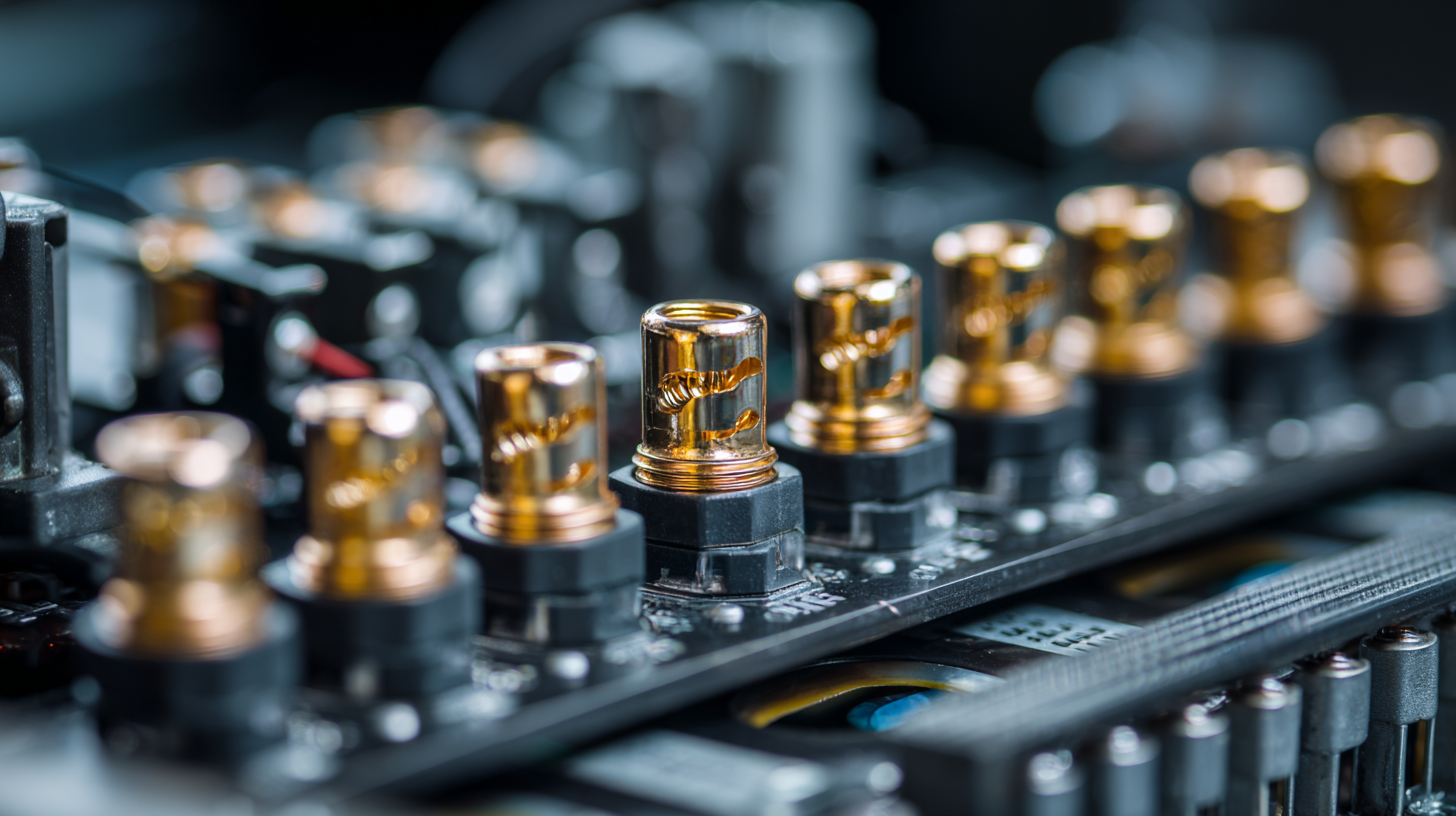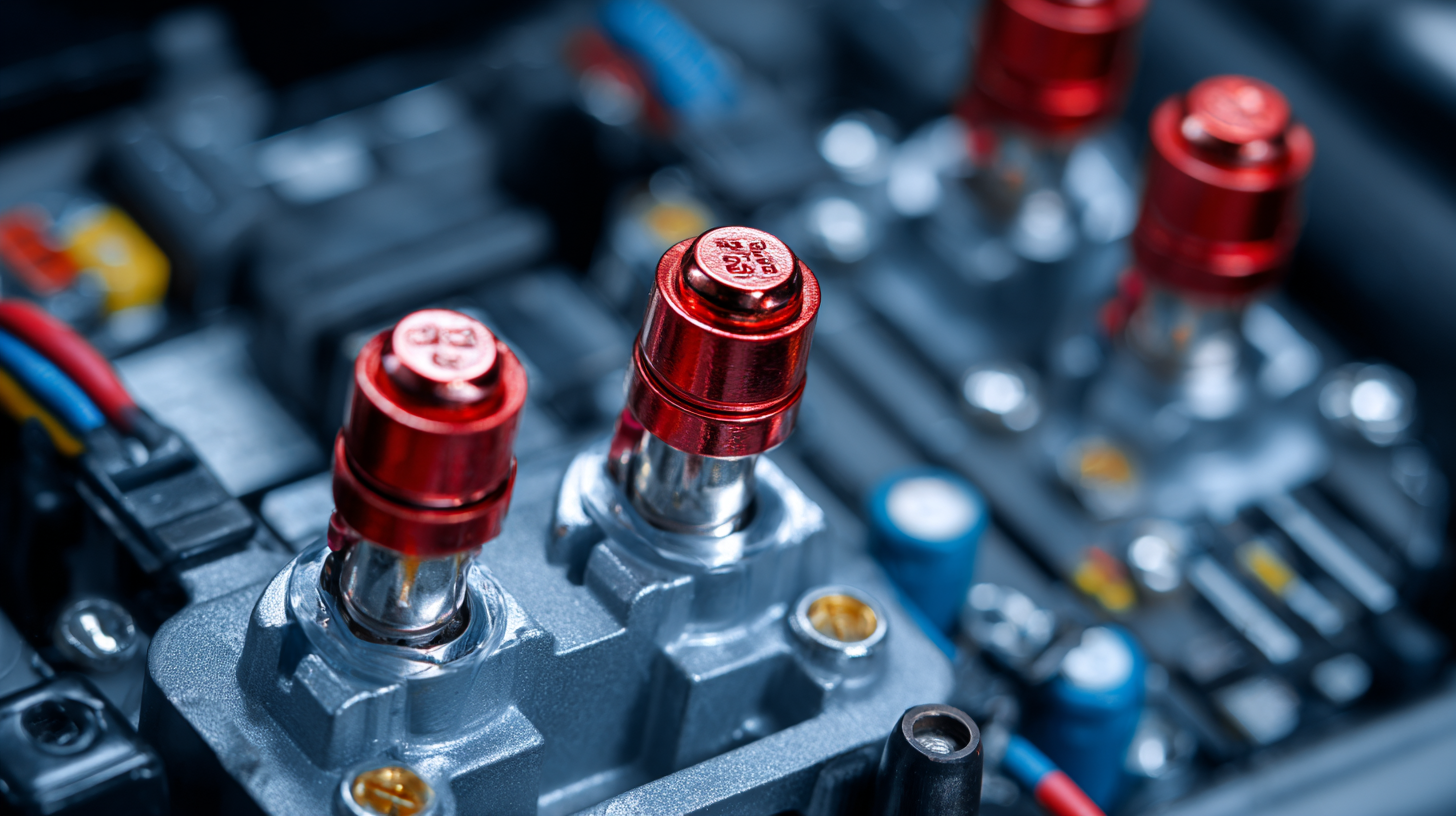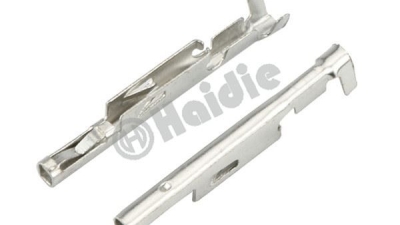The Ultimate Guide to Sourcing the Best Automotive Electrical Terminals for Optimal Vehicle Performance
Table of Contents
- Understanding the Importance of Quality Automotive Electrical Terminals
- Key Features to Look for in Automotive Electrical Terminals
- Identifying Reliable Manufacturers in the Automotive Industry
- Evaluating Manufacturer Certifications and Standards Compliance
- Comparing Cost vs. Quality in Automotive Electrical Terminal Sourcing
- Best Practices for Testing and Selecting Automotive Electrical Terminals
- Maximize Your Electrical Connections: Discover the IL-AG5-C1-5000 Automotive Crimping Connector Terminals!
- FAQS
- Related Posts
The automotive world is changing pretty fast these days. Experts are expecting a steady growth rate of about 3.1% CAGR in automotive electrical parts, like electrical terminals – and it’s all thanks to the rising demand for smarter, more advanced vehicle tech and better overall performance. As cars get trickier with more complex systems, the quality and reliability of parts like electrical terminals really become a big deal—they’re key to keeping everything running smoothly. At Yueqing Haidie Electric Co., Ltd., we’re all about providing top-notch wire harness solutions tailored specifically for the auto industry. Our products are reliable and efficient, and many customers have praised our work—so much so that our reputation helps support new brands and keeps us committed to pushing vehicle performance even further. In this guide, we’ll dive into the latest trends in the industry, share some tips for sourcing the best automotive electrical terminals, and explore how innovative solutions can make a real difference in how well vehicles perform now and into 2025 and beyond.

Understanding the Importance of Quality Automotive Electrical Terminals
When it comes to keeping a vehicle running smoothly, the quality of electrical terminals really matters more than most people realize. Good, reliable automotive electrical terminals not only make sure your connections are secure but also boost the electrical flow. All of this adds up to a more dependable electrical system overall. As cars keep evolving, the need for top-notch terminals is actually growing fast — experts say the market for automotive terminals is set to expand quite a bit in the next few years.

If you're trying to pick out the best automotive electrical terminals, here are a few tips you might find useful: First off, look for terminals made from quality materials with good finishes — these will handle tough conditions and resist corrosion, which is super important if you want your system to last. Next, double-check that the terminals match up with your vehicle’s wiring harness — it helps avoid annoying connection problems down the line. When everything lines up correctly, your system will work more reliably.
And don’t forget, investing in a decent crimping tool can really make a difference. A good tool helps you attach the terminals securely, reducing the chances of electrical hiccups later on. So, in a nutshell, prioritizing quality in both the terminals and the tools you use ensures your vehicle stays running smoothly and lasts longer — it’s totally worth it.
Key Features to Look for in Automotive Electrical Terminals
When you're on the hunt for automotive electrical terminals, it's pretty important to pay attention to a few key features—things that really impact how well your vehicle performs and how reliable it is. First off, materials matter a lot. Look for terminals made from good conductors like copper or brass—they help electrical signals flow smoothly, which is super important for everything running seamlessly. Also, it's a smart move to choose those with corrosion-resistant coatings, like nickel plating. That way, they’ll last longer, especially when they're exposed to tough conditions out on the road.
Another thing to keep in mind is the design of the terminal itself. You want options that ensure a solid, secure connection—think crimped or soldered types—because loose connections can cause all sorts of headaches later on. Size is also key—making sure it fits with your connectors is a no-brainer, since mismatched parts can lead to poor performance or even complete system failures. And, don’t forget about insulation! Good insulation in the design helps prevent shorts and keeps things safe overall. All these factors play a big role in keeping your vehicle's electrical system running smoothly and efficiently.
Identifying Reliable Manufacturers in the Automotive Industry
When you're on the hunt for automotive electrical terminals, building a good relationship with your suppliers is pretty much essential to keep your vehicle running smoothly. I’d suggest starting with some solid research—look for manufacturers who really have a good rep in the auto industry. It’s also smart to pick companies that have the right certifications and stick to industry standards; these are often signs they care about quality and reliability.
**Tip 1:** Don’t just jump into big orders without testing first. Ask for samples! That way, you can actually see if the terminals are up to snuff and compatible with your specific needs. It might seem like a small step, but it can save you a lot of trouble down the line by ensuring they perform just as you expect.
Also, it’s worth looking into manufacturers who offer solid customer support and are upfront about their production process. Good, transparent communication can actually tell you a lot about whether they’re dependable and how willing they are to help out if something’s not right.
**Tip 2:** Take some time to read reviews or testimonials from other auto companies. Hearing what others have experienced can really give you a clearer picture of a manufacturer’s consistency, reliability, and whether they deliver quality products on time. In the end, that’s a big deal when you're trying to keep your operations running smoothly.
Evaluating Manufacturer Certifications and Standards Compliance
When you're sourcing car electrical terminals, it's super important to make sure the manufacturers meet certain certifications and standards. Organizations like ISO (International Organization for Standardization) and SAE (Society of Automotive Engineers) set guidelines that help ensure the quality and reliability of these components. If a manufacturer sticks to these standards, it shows they really care about doing things right — and that means there's less chance of parts failing when the car's actually on the road. This is especially crucial in autos, where a good, solid connection can make a real difference when it comes to safety and performance.

Of course, beyond just ISO and SAE, you wanna look at whether the manufacturer also follows other industry-specific rules and testing protocols. Things like UL (Underwriters Laboratories) certification are a good sign of safety and durability, and environmental standards are important too — making sure that materials used aren’t just effective, but also safe and eco-friendly. By choosing suppliers with proven certifications and a good track record, automakers can make the sourcing process smoother and boost the overall quality of their vehicles. That kind of attention to detail not only keeps the cars running smoothly but also builds trust with customers who rely on them every day.
Comparing Cost vs. Quality in Automotive Electrical Terminal Sourcing
When you're sourcing automotive electrical terminals, it’s pretty important to strike a balance between cost and quality. I know, it’s tempting to just go for the cheaper options, but honestly, lower prices often mean lower performance and durability. Keep in mind, your vehicle’s electrical system is key to how well everything runs, and using subpar terminals can lead to all sorts of issues—like electrical failures, higher resistance, and in the end, some pretty costly repairs.
**A little tip:** When you're checking out different terminals, look for materials that are good conductors and resist corrosion—things like copper or gold-plated options are generally reliable. Also, don’t forget to see if they have the right certifications that prove they meet industry standards. Warranties can also tell you a lot about how confident the manufacturer is in their product’s quality.
Another thing to think about is what exactly you need those terminals for. Different vehicles and parts might require specific types, which can affect the price. So, investing a bit more in high-quality terminals designed for your vehicle isn’t just about peace of mind—it can save you money in the long run by avoiding costly breakdowns and ongoing maintenance.
**Pro tip:** Before you start shopping, make a checklist of your vehicle’s electrical needs. And don’t hesitate to ask experts or read reviews—getting some insights can really help you find the best options tailored to your ride.
The Ultimate Guide to Sourcing the Best Automotive Electrical Terminals for Optimal Vehicle Performance - Comparing Cost vs. Quality in Automotive Electrical Terminal Sourcing
| Terminal Type | Material | Price Range ($) | Current Rating (A) | Temperature Rating (°C) | Corrosion Resistance |
|---|---|---|---|---|---|
| Butt Connector | Copper | 0.10 - 0.50 | 30 | -40 to 105 | Yes |
| Ring Terminal | Brass | 0.15 - 0.70 | 50 | -50 to 100 | Yes |
| Spade Connector | Copper Alloy | 0.20 - 0.60 | 40 | -40 to 120 | No |
| Male/Female Connector | Aluminum | 0.25 - 1.00 | 60 | -40 to 150 | Yes |
| Bullet Connector | Stainless Steel | 0.30 - 0.80 | 40 | -50 to 200 | Yes |
Best Practices for Testing and Selecting Automotive Electrical Terminals
When you're talking about keeping your vehicle running smoothly, choosing the right automotive electrical terminals really matters. Picking the right ones and testing them out can make a big difference in how reliable and efficient your electrical connections are. To make smart decisions, it’s good to get a handle on what makes a terminal high-quality and how it performs.
Here’s a tip: start by checking out what material the terminal is made from. Good quality terminals are usually crafted from copper or brass—they’re great for conducting electricity and resisting rust and corrosion. Also, take a look at the coating—things like tin plating can help your terminals last longer and stand up better to the elements.
Another thing to keep in mind is the size and fit. Make sure the terminals you pick actually match the wire gauge you're using. That way, you get a tight fit without any loose connections—nothing worse than a shaky contact. And don’t forget, using proper testing methods like a pull test or resistance check can help confirm that your terminals will hold up under driving conditions. Honestly, paying close attention during the selection process can really boost your vehicle’s overall performance and reliability.
Maximize Your Electrical Connections: Discover the IL-AG5-C1-5000 Automotive Crimping Connector Terminals!
Maximize your electrical connections with the IL-AG5-C1-5000 Automotive Crimping Connector Terminals. Designed specifically for automotive applications, these connector terminals provide a reliable and efficient solution for your wiring needs. Whether you are working on a complex automotive system or a simple DIY project, the IL-AG5-C1-5000 terminals ensure optimal connectivity and durability.
The IL-AG5-C1-5000 connectors are crafted with high-quality materials that offer excellent conductivity and corrosion resistance. Their design allows for easy installation, making them ideal for both professionals and hobbyists. With these terminals, you can achieve a snug fit and a strong electrical connection, resulting in improved performance and safety for your automotive electrical systems.
In addition to their impressive functionality, the IL-AG5-C1-5000 terminals come in a compact form factor that saves space and simplifies wiring layouts. This makes them a perfect choice for modern vehicles where space is at a premium. By choosing the IL-AG5-C1-5000 Electrical Automotive Crimping Connector Terminals, you are investing in a product that will enhance the reliability of your electrical connections and maximize the efficiency of your automotive projects.
FAQS
: High-quality automotive electrical terminals ensure secure connections, enhance electrical conductivity, and contribute to the overall reliability of a vehicle’s electrical system, which is crucial for optimal performance.
Key features include material quality (preferably high-conductivity materials like copper or brass), corrosion-resistant finishes, secure connection designs (like crimped or soldered options), compatibility with connectors, and enhanced insulation properties.
To ensure compatibility, select terminals specifically designed for your vehicle's wiring harness to avoid connectivity issues. Proper matching guarantees optimal functioning within the system.
Investing in high-quality crimping tools enhances the connection-making process by ensuring securely attached terminals, which minimizes the risk of electrical failures in the future.
Research manufacturers with a solid reputation in the automotive industry, check for certifications, and seek those who adhere to industry standards to ensure quality and reliability.
Yes, requesting samples allows you to assess the quality and compatibility of the terminals with your specific applications, ensuring they meet your performance requirements.
Look for manufacturers that offer comprehensive customer support and transparent communication, as this indicates reliability and a willingness to address any concerns.
Checking reviews and testimonials from other automotive companies can provide insights into a manufacturer’s consistency and reliability in delivering quality products on time, which is essential for efficient operations.
Related Posts
-

Exploring Unique Alternatives to Best Automotive Crimp Connectors for Your Projects
-

Comprehensive Guide to Best Wire Connecters with Technical Specifications and Installation Tips
-

Ultimate Guide to Choosing the Best Connecting Pin for Optimal Performance in Your Industry
-

The Definitive Guide to Choosing the Best Automotive Circuit Connectors for Maximum Performance
-

Proudly Made in China Best Elevator Connector for a Global Market
-

Exploring Industry Case Studies: The Versatile Use of Best Wire Harness Connectors
Blog Tags:


